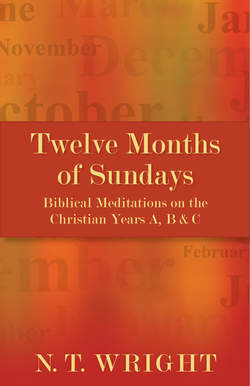Читать книгу Twelve Months of Sundays - N.T. Wright - Страница 31
На сайте Литреса книга снята с продажи.
ОглавлениеThe Fourth Sunday of Lent
1 Samuel 16.1–13
Ephesians 5.8–14
John 9.1–41
Don’t miss the sinister moment towards the end of John’s great story. We were told from the beginning that the blind man’s condition from birth had nothing to do with previous sins, whether his own or his parents’. That possibility, so prevalent in folk-religion (and in some more sophisticated systems), is alien to the Judaeo-Christian tradition. The Bible regularly refuses to ask ‘why?’, but rather ‘what?’ Our instinct is to look for a ‘solution’ in terms of a theory about the cause or origin of suffering (which might then mean we wouldn’t need to do anything further). God’s is to provide a solution by working towards new creation.
The Pharisees, however, don’t see it like this. Jesus is a sabbath-breaker; he can’t be the Messiah. His mighty works must have a different origin. He is deceiving the people. When pushed in discussion, they give the answer Jesus rejected to the question with which the chapter began: ‘you were born entirely in sins’ (v. 34). Your condition proves that you, and your parents, were in fact ‘sinners’, so you can’t teach us. There is a distant echo of Psalm 51.7, but they can’t be thinking of that (it would apply to them too).
The notion of purity in some sectarian Jewish groups (the Dead Sea Scrolls have the same idea) includes physical wholeness. It was this symbolic world, claiming to be the true observance of the Jewish law, that Jesus opposed with his fresh vision of that very Jewish vocation, to be the light of the world (v. 5). His healings, with all their own rich symbolic value, posed a deep-level challenge: is this not what it means to be loyal to the God of Israel, to be doing his work of salvation and new creation? If this is so, to cling to the symbols of a different world, a hard, exclusive system, is to be truly blind. It is to call down on oneself the very judgement one has pronounced on others (v. 41).
God sees, then, in a different mode to how we see, as Samuel discovered when examining Jesse’s sons – every bit as subversive an action, granted that Saul was still king, as that of Jesus in healing on the sabbath. Christian obedience can be categorized, as a result, in terms of learning to see differently. The image of light flickers and flashes through Ephesians 5: you are light, you are children of light, so your role (unfashionable though this may be) is to shine into the dark corners of life and show up what is going on. In doing so, you are acting as agents of Christ himself, the world’s true light, summoning the dead to life, to wake up to God’s new day. This message is all the more important at a time when our culture seems to have forgotten the meaning of shame. Take the reading back a couple of verses: ‘Let no one deceive you with empty words.’
